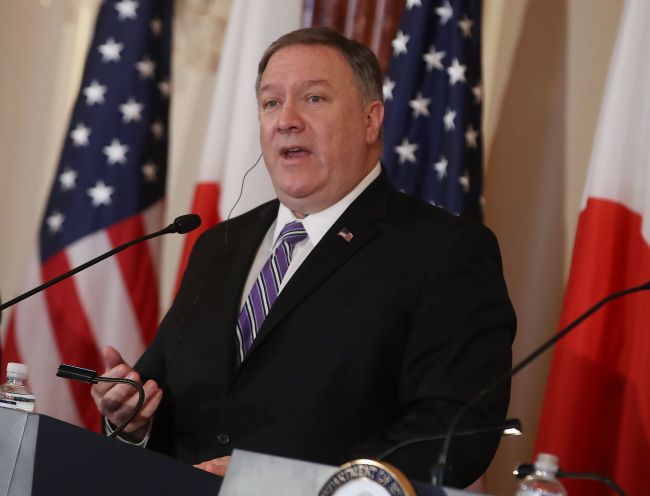Pompeo says he will continue to lead nuclear talks with N. Korea
By YonhapPublished : April 20, 2019 - 10:52
WASHINGTON -- US Secretary of State Mike Pompeo said Friday that he will continue to lead nuclear disarmament talks with North Korea, dismissing the regime’s call for his replacement.
Pompeo’s remark comes after a North Korean official accused the top US diplomat of failing to understand Pyongyang’s position and called for his replacement with a “more careful and mature” negotiator.
“Nothing’s changed,” Pompeo said in a press conference after meeting with his Japanese counterpart and the two countries’ defense chiefs.

“We’re continuing to work to negotiate. I’m still in charge of the team. President Trump’s obviously in charge of the overall effort, but it will be my team and Special Representative (Stephen) Biegun will continue to lead the US efforts to achieve what Chairman Kim committed to do back in June of last year, which was to denuclearize,” he said.
At their first summit in Singapore in June, North Korean leader Kim Jong-un and US President Donald Trump agreed to work toward complete denuclearization of the Korean Peninsula in exchange for security guarantees for Pyongyang.
Kim and Trump held a second summit in Vietnam in February, but failed to reach any agreement due to differences over the scope of the North’s denuclearization and sanctions relief from the US
Amid the deadlock, North Korea test-fired what it called a new “tactical guided weapon” this week under the supervision of its leader Kim, and also mounted an attack on Pompeo.
The secretary said he is convinced there is still a “real opportunity” to achieve the North’s denuclearization and that his diplomatic team will remain in the lead.
North Korea was a key subject of discussion at Friday’s 2+2 talks, which also involved acting US Defense Secretary Patrick Shanahan, his Japanese counterpart, Takeshi Iwaya, and Japanese Foreign Minister Taro Kono.
The two sides reaffirmed their commitment to achieving the final, fully verified denuclearization of North Korea, according to the US officials.
The Japanese foreign minister described the goal using the earlier term of complete, verifiable and irreversible denuclearization.
“In cooperation with the international community, and in accordance with relevant UN Security Council resolutions, we will continue to press North Korea to abandon all of its weapons of mass destruction, ballistic missiles, and related programs and facilities,” Pompeo said. “We’ll continue to enforce all sanctions against North Korea, and encourage every country to do so.”
Trump has said that he wants a “big deal” under which the North would dismantle all of its nuclear arsenal and related facilities in exchange for the removal of US-led sanctions on the regime.
North Korea has vowed not to give in to such “gangster-like” demands and threatened to abandon the negotiations if the US sticks to its position.
In a speech to the North’s parliament last week, Kim said he was open to a third summit with Trump if the US came with the “right attitude” and offered to wait until the end of the year for the US to make a bold decision on future negotiations.
Trump responded via Twitter that he agreed with Kim that a third summit would be “good.”
Asked if he believes the negotiations can move forward without accepting the North’s demand for some sanctions relief, Pompeo said, “Yes.” He didn’t elaborate.
Kono noted that the US-Japan commitment to enforcing UN sanctions against North Korea extended to the regime’s abandonment of missiles “of all ranges.”
The minister was apparently referring to the shorter-range missiles that pose a threat to Japan, not just the intercontinental ballistic missiles that threaten the continental US.
Both the American and Japanese officials spoke of their joint efforts to stop illicit ship-to-ship transfers of oil to North Korea, as well as to increase trilateral cooperation with South Korea. (Yonhap)








![[KH Explains] How should Korea adjust its trade defenses against Chinese EVs?](http://res.heraldm.com/phpwas/restmb_idxmake.php?idx=644&simg=/content/image/2024/04/15/20240415050562_0.jpg&u=20240415144419)











![[Today’s K-pop] Stray Kids to return soon: report](http://res.heraldm.com/phpwas/restmb_idxmake.php?idx=642&simg=/content/image/2024/04/16/20240416050713_0.jpg&u=)